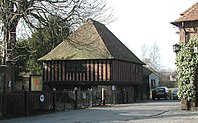Fordwich
| Fordwich | |
|---|---|
 Fordwich Town Hall |
|
| Fordwich shown within Kent | |
| Area | 1.81 km2 (0.70 sq mi) |
| Population | 381 (civil parish 2011) |
| • Density | 210/km2 (540/sq mi) |
| OS grid reference | TR179597 |
| • London | 65.8 miles |
| Civil parish |
|
| District | |
| Shire county | |
| Region | |
| Country | England |
| Sovereign state | United Kingdom |
| Post town | CANTERBURY |
| Postcode district | CT2 |
| Dialling code | 01227 |
| Police | Kent |
| Fire | Kent |
| Ambulance | South East Coast |
| EU Parliament | South East England |
| UK Parliament | |
Fordwich /ˈfɔːrdwɪtʃ/ is a very small town and a civil parish in east Kent, England, on the River Stour, northeast of Canterbury.
It is the smallest community by population in Britain with a town council. Its population increased by 30 between 2001 and 2011.
Although many miles inland, it was the main port for Canterbury, which traded directly with London and Channel ports and indirectly with the near Continent, before the Wantsum Channel silted up making the Isle of Thanet part of mainland England.
The town grew in the Middle Ages as a port for boats on their way upriver to Canterbury. All of the Caen stone used by the Normans to rebuild Canterbury Cathedral in the 12th and 13th centuries was landed at Fordwich. It later became a limb of the Cinque Ports. It lost its status as a town in 1880 when it no longer had a Mayor and Corporation. However, in a reorganisation in 1972, Fordwich was again made a town as much as anything because of its prior importance in what is now a rather sleepy corner of Kent. Fordwich Town Hall, supposedly the smallest in England, dates from the earlier period, having been rebuilt in 1555.
The ancient Church of St Mary the Virgin, now redundant but open to the public, and in the care of the Churches Conservation Trust, contains part of a carved sarcophagus reputed to have contained the remains of St Augustine of Canterbury. The 16th-century building next the Town Hall, now known as Watergate House, was the family home of John and Gregory Blaxland, early 19th-century pioneers of Australia.
...
Wikipedia

